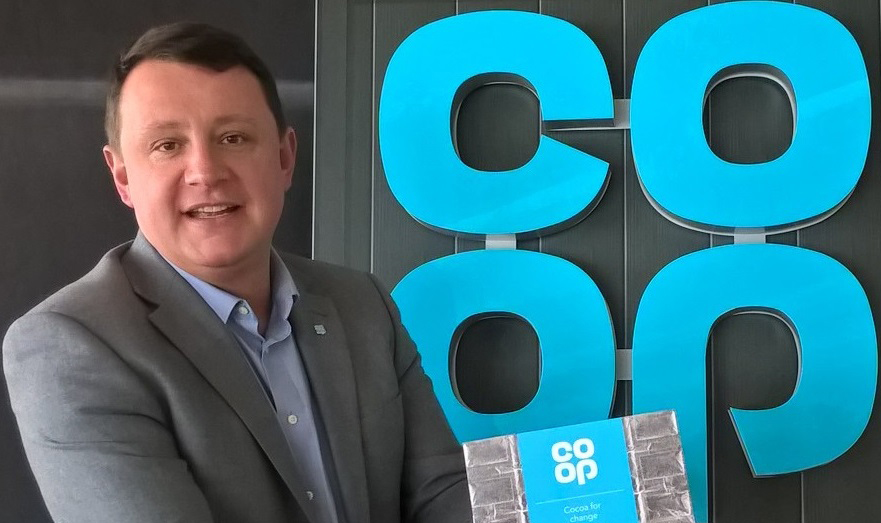Campaign group Stop Funding Hate has repeated its call for the Co-op Group to stop advertising in the Daily Express, Sun and Daily Mail.
In a letter sent on behalf of members to new chief executive Steve Murrells, it asks the co-operative to stop advertising in those publications for their coverage of refugees, immigrants, Muslims and other minorities.
Co-op Food and Co-op Insurance advertise regularly in the Daily Express, which SFH says is “notorious for its relentless campaign against minority groups”.
The letter, signed by 365 members and also addressed to member nominated directors Ruth Spellman, Paul Chandler and Hazel Blears, adds: “By paying these newspapers to put our brand in their pages and on their websites, we are taking the conscious decision to associate ourselves with their content. Our adverts sit alongside divisive stories about immigrants, refugees, Muslims and other groups. These often turn out to be ‘grossly distorted’ or even ‘outright fabrications’ according to the United Nations, which has specifically cited the Sun and the Daily Express in a statement on ‘hate speech’ and ‘extremist media’, and called out the Daily Mail over its ‘unique’ hostility to migrants.
“Advertising in media that promotes fear, division and intolerance is the antithesis of what we should be doing. There simply must be more appropriate advertising channels and brand partnerships for the Co-op to associate with.
“We look forward to hearing more about ‘the Co-op Way’ policy review at this year’s AGM and urge that this opportunity is taken to re-establish the Co-op as a pioneer of ethical business, including by aligning our advertising procurement with our ethics, values and principles.”

Richard Wilson, co-founder of Stop Funding Hate, said: “As the Co-op works to rebuild its reputation as one of Britain’s leading ethical retailers, many members will see this as a crucial litmus test.
“Walking away from hate should make sense to an organisation which abides by co-operative values and has a proud legacy of ethical leadership.”
He added: “Everyone understands that the Co-op needs to advertise. But with hate crime on the rise, it is vital that the Co-op acts to ensure that its marketing budget is not fuelling hatred, discrimination and racism.
“The ‘Co-op Way’ review presents an opportunity to show that the Co-op is still living by the values for which it is so well-known.”
When the campaign raised the issue last year, the Group’s then-chief executive Richard Pennycook told campaigners the Group was looking at its advertising policy “to see whether we can align it more closely with our natural sources of support rather than more generic media advertising”.
But he added: “We do need to be cognisant of commercial realities too, in terms of which advertising channels yield the best results.”

Now, in a new response to the campaign, National Members’s Council president Nick Crofts said the Group had raised its concerns with the papers in question and would use its advertising in those papers to spread an ethical message.
He said: “When the Stop Funding Hate campaign appealed to us to stop advertising in a small number of newspapers we took that request seriously. We launched an internal audit of our activity, analysed its payback, and talked to our members about it at a National Members’ Council meeting.
“Many people buy these papers at the Co-op and some of them will be our members. Advertising in these papers also drives sales which are important to our businesses.”
He said advertising was important for a business looking to rebuild and grow but accepted the concerns of members. Because of this, the Group had raised those concerns with two of the newspapers in question.
“We committed to do two things to reflect our values and support our business. Things that recognise the diversity of our members and customers, that don’t suppress the freedom of the press, which is a fundamental part of a democracy, that support the growth of our businesses, but crucially challenge those views expressed in print which we and many of our members believe are incompatible with our values of equality, solidarity, self-help and openness.
“Firstly we decided to use our contacts with publishers at every level to make the case for change. To tell them how our members felt and why the stories they have published challenge the relationship we have with them. We’ve already had meetings with senior executives at the Daily Mail and The Sun, and the discussions will continue.”
He added that the Group was looking to use its advertising in these papers to “tell their millions of readers about some of the things our Co-op is doing to tackle issues that we feel strongly about, such as modern slavery or water poverty in Africa and promoting Fairtrade programmes in developing countries.
“If we want to campaign for change, we believe it is better to engage and challenge, than to walk away. And we will keep at it.”
But he said the Group had suspended its paid advertising with YouTube after concerns were raised about “grossly inappropriate content, including extremist videos” on the site.
He added: “Until we are satisfied that our digital advertising will only ever appear next to appropriate content, we have suspended paid advertising with YouTube. We’ve seen the ‘advertiser safeguards’ Google has published and we’ll watch to see how these work before we decide whether or not to reinstate advertising with them.”
Mr Crofts said the Group was also taking into account rapid technological change to the advertising market and was extending its review of its advertising policy “ to look at all the platforms we use and others we don’t but perhaps could”.
He added: “We know what we’re doing won’t satisfy everybody and we know we will have to watch closely to see if what we are doing has any impact.
“We believe, for now, it strikes the right balance between doing the right thing for those who need a voice and the right thing for our 4.3m members and our businesses.”